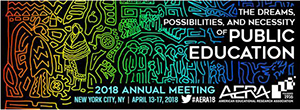This past April, I attended my first American Educational Research Association (AERA) Annual Conference and presented in a roundtable discussion with Allison BrckaLorenz, FSSE Project Manager. The roundtable, themed Student and Faculty Perspectives on Inclusive Curriculum and Teaching, included four papers. Our paper, Student and Faculty Perspectives on the Emphasis of Inclusive and Culturally Engaging Coursework, utilized the Inclusiveness and Engagement with Cultural Diversity module for both NSSE and FSSE to examine ways in which students and faculty perceive their coursework emphasizing diversity and inclusion based on different academic and cultural demographics. Complementing the three additional papers at our table, presenters and participants alike had an engaging conversation on what institutions can do to encourage these practices.
Overall, the presented papers supported the notion that intentionally incorporating inclusive practices and diversity-related topics into the classroom benefits students. However, who benefits and to what degree may differ depending on the identity and experiences of both the faculty and students. These types of practices can be integrated across disciplines and throughout the curriculum, but the degree of implementation does vary. A few questions emerged from these results:
- What motivates faculty to incorporate diverse and inclusive practices into their coursework?
- What role do administrators, students, and faculty play in encouraging these practices?
- How might diversity and inclusion look different across disciplines? What determines a best practice?
The benefit of a roundtable discussion is the candid dialogue and connections that can be made when presenting in a more informal setting. As I listened to the results from other papers, I asked myself - So now what? What can we do to encourage these types of practices? What do we not know about student and faculty engagement with diversity and inclusion? With the new Inclusiveness and Engagement with Cultural Diversity module, there are more avenues to explore the ways in which colleges and universities create inclusive environments and engage their students. I look forward to learning more about inclusive engagement and sharing our research with scholars and practitioners looking to transform higher education practices.


